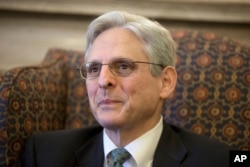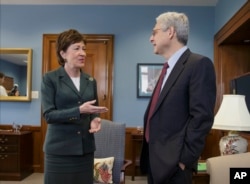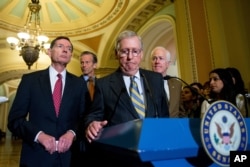The battle over President Barack Obama’s Supreme Court nominee increased in fury but came no closer to resolution as rhetorical barbs sharpened and tempers flared on Capitol Hill.
While Judge Merrick Garland continued to meet with senators, debate over his nomination devolved into finger-pointing about lawmakers’ motivations and was punctuated by sharp criticism of the Supreme Court’s chief justice.
Assistant Democratic Leader Dick Durbin said Republicans’ refusal to consider Garland is part of a campaign to delegitimize President Obama.
"I will say what the president probably will not say: I believe it is personal," Senator Durbin said after meeting with Garland Wednesday. "I think it is a decision made by the Republicans to deny President Barack Obama his authority."
Republicans insist their sole aim is to insulate the confirmation process from the political crosswinds of a presidential campaign season.
In an unusual move, the chairman of the Senate Judiciary Committee, Chuck Grassley, took Chief Justice of the United States John Roberts to task for a recent speech bemoaning political fights in the Senate’s judicial confirmation process. Roberts argued such partisanship erodes the public’s confidence in the high court’s independence and objectivity.
“The chief justice has it exactly backwards,” Grassley said. “Too often, there is little difference between the actions of the court and the actions of the political branches.”
“So, physician, heal thyself,” the senator added.
Roberts was nominated by Republican President George W. Bush and Grassley’s critique put Democrats in the unusual position of defending someone many in their caucus had opposed for the high court in 2005.
“Justice Roberts isn’t the one who needs healing,” Democratic Leader Harry Reid said. “What needs mending is the Judiciary Committee under his [Grassley’s] chairmanship, which he has annexed as a political arm of the Republican leader’s office.”
Republicans rushed to Grassley’s defense.
“The tone of these attacks against Senator Grassley have been vicious,” said Senator John Barrasso. “Senator Grassley is an outstanding public servant.”
On Tuesday, Senator Susan Collins became the second Republican to urge confirmation hearings for Garland, Obama’s pick to fill the Supreme Court vacancy created by the death of Justice Antonin Scalia in February.
“I think what we should do is follow the normal process with the nominee that has been sent up by the president,” Collins said after meeting with Garland at her Senate office.
Collins suggested fellow Republicans are taking a big gamble by waiting for the next president to choose a nominee rather than considering Garland, who is widely viewed as a judicial moderate.
“It would be ironic if the next president happens to be a Democrat and chooses someone who is far to Judge Garland’s left," Collins said.
Republican Majority Leader Mitch McConnell downplayed the significance of Collins' deviation from the party line.
"The situation when we broke for the recess two weeks ago was that there were 52 Republican senators who didn't think we needed either hearings or a vote in committee. Today, two weeks later, we have 52 Republicans who think we don't need either hearings or a vote in committee," McConnell said Tuesday.
Democrats, meanwhile, continue to mount a full-throated campaign demanding Garland’s consideration by the Senate.
"The president is required to nominate all four years [of his term], and we here in the Senate are required to proceed to determine whether that nomination is of unfit character or fit character," said Senator Jeff Merkley.
"For short-term gain, destroying the Supreme Court – polarizing, diminishing the Supreme Court – is not in the interest of our nation,” Merkley added.
"Democrats want to ignore the will of the people on this Supreme Court nomination," countered Republican Barrasso. "Now that the election season is upon us, it should be the people’s decision."













